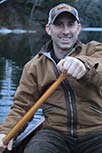The Loneliest of Electrons
Published by Spoon River
When we first met in Cologne [seven centuries ago], our love
was pure European alchemy. No science to that attraction.
Just a philosophical belief that love and the Classic Elements
would carry us. We tried [so vainly, we tried] to transmutate
what we had [All the elements of love, we whispered]
into precious gold. We experimented but ended
with just batches [batches batches] of useless panacea.
Later, after our fifth breakup [the summer of 1661], I rented a threadbare
laboratory in a London brownstone overlooking the River Thames
and delved into that newest science—chymistry, discovering
the smallest things of love and life, which I named atoms .
I studied the parts—protons [secure like your new lovers]
hugging the nucleus [you]. In the outer reaches of all of this—
the loneliest of electrons [me]—unstable and spinning a sad orbital.
Sometime after the nuclide of our love fissioned for the seventh time
[how can that be—I named us uncuttable?] during winter in Red Hook
1837, I realized I needed no laboratory—no fancy equipment
—to understand acidity and basicity. After so many bad reactions ,
we proved [beyond any doubt] that the crucial things
exchanged between acids and bases [or two broken lovers]
are just charges [You to me—Liar! Me to you—Whore!].
One last experiment, we pleaded to the other. We consented,
then moved to Los Alamos, 1942. I attempted to transform
our substances through our interactions with the other. [Remember?]
One last experiment, we said—and meant it. But we failed.
We never had the form of energy needed.
After Los Alamos, there were no more chemical bonds
of love. Just oxidation. Just reduction. Dissociation.
Over seven hundred years I delved into alchemy, conjectured
the science of chymistry, perfected modern chemistry. With all this
science, I just spin round and round [the least stable of electrons]
and posit, What if we are atoms [no longer protons and electrons]? What if
I can fuse us together, like that first night? I return to the lab,
muttering to the useless beakers and Bunsen burners, Chemical bonding?
It is more than repulsion. Can it be more than attraction?
- For us, our elements / only fire—love, lust, need.
- After the Greek word / “uncuttable.” / Our love, I hummed.
- Broken plates / broken hearts / broken promises / broken hearts.
- We haven’t talk for over a / century. Near enough, two.
- I named them / “uncuttable,” to hold us together. / “Uncuttable,” I named / us.
- You-me.
- A spring Cologne night—the wind / chilled, the earliest budding of flowers.


